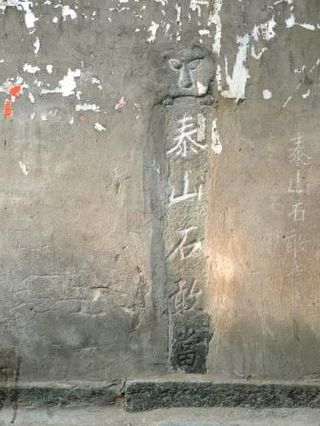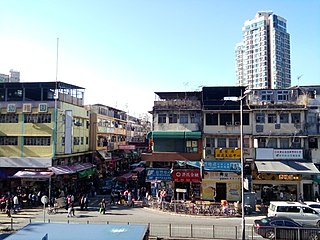
Feng shui, sometimes called Chinese geomancy, is an ancient Chinese traditional practice which claims to use energy forces to harmonize individuals with their surrounding environment. The term feng shui means, literally, "wind-water". From ancient times, landscapes and bodies of water were thought to direct the flow of the universal Qi – "cosmic current" or energy – through places and structures. More broadly, feng shui includes astronomical, astrological, architectural, cosmological, geographical and topographical dimensions.

Sham Shui Po is an area of Kowloon, Hong Kong, situated in the northwestern part of the Kowloon Peninsula, north of Tai Kok Tsui, east of Cheung Sha Wan and south of Shek Kip Mei (石硤尾). It is located in and is the namesake of the Sham Shui Po District.

Pixiu is a Chinese mythical hybrid creature. Pixiu are considered powerful protectors of the souls of the dead, xian, and feng shui practitioners, and resemble strong, winged lions. A Pixiu is an earth and sea variation, particularly an influential and auspicious creature for wealth, and is said to have a voracious appetite exclusively for gold, silver, and jewels. Therefore, traditionally to the Chinese, Pixiu have always been regarded as auspicious creatures that possessed mystical powers capable of drawing cai qi from all directions, and according to the Chinese zodiac, it is especially helpful for those who are going through a bad year.

Cheung Chau Bun Festival or Cheung Chau Da Jiu Festival is a traditional Chinese festival on the island of Cheung Chau in Hong Kong. Held annually, and with therefore the most public exposure, it is by far the most famous of such Da Jiu festivals, with Jiu being a Taoist sacrificial ceremony. Such events are held by mostly rural communities in Hong Kong, either annually or at a set interval of years ranging all the way up to once every 60 years. Other places that may share the folk custom include Taiwan, Sichuan, Fujian and Guangdong.

Ni Cong, courtesy name Yiming, better known by his pen name Ni Kuang, was a Hong Kong-American novelist and screenwriter. He wrote over 300 Chinese-language wuxia and science fiction novels, and more than 400 film scripts.

Sheung Shui is an area in the New Territories, Hong Kong. Sheung Shui Town, a part of this area, is part of the Fanling–Sheung Shui New Town in the North District of Hong Kong. Fanling Town is to its southeast.

Eric Tsang Chi-waiMH is a Hong Kong actor, film director, producer, and television host, best known for hosting the variety show Super Trio series on the Hong Kong television network TVB over 18 years. He currently holds the general manager post at TVB.

Bat lau dung laai is a Hong Kong Cantonese corruption of the Vietnamese phrase bắt đầu từ nay, meaning "from now on".

Shek Wing-cheung, better known by his stage name Shih Kien, Sek Kin, or Sek Gin or Shek Kin(Chinese: 石堅; pinyin: Shí Jiān; Jyutping: Sek6 Gin1), was a Hong Kong–based Chinese actor and martial artist. Shih is best known for playing antagonists and villains in several early Hong Kong wuxia and martial arts films that dated back to the black-and-white period, and is most familiar to Western audiences for his portrayal of the primary villain, Han, in the 1973 martial arts film Enter the Dragon, which starred Bruce Lee.

Na Tuk Gong are local guardian spirits worshipped by overseas Chinese communities in Malaysia, Singapore and parts of Indonesia, especially Sumatra. An alternate more generic name for the cult is Datuk Gong, uniting Dato or Datuk from the local Malay word for 'grandfather', which is also used as an honorific title, and Kong or Gong from Chinese, also an honorific title. According to Taoist tradition, a Na Tuk Kong's could hold the official title 拿督尊王. It is important to note that Datuk Keramat, Datuk Gong and Na Tuk Kong all refer to the same deity. For the sake of clarity, the term Datuk, which is universally used to describe the spirit in Malaysia, will be used.

Tung Shing is a Chinese divination guide and almanac. It consists primarily of a calendar based on the Chinese lunar year.

A spirit tablet, memorial tablet, or ancestral tablet is a placard that people used to designate the seat of a deity or past ancestor as well as to enclose it. The name of the deity or the past ancestor is usually inscribed onto the tablet. With origins in traditional Chinese culture, the spirit tablet is a common sight in many East Asian countries, where forms of ancestor veneration are practiced. Spirit tablets are traditional ritual objects commonly seen in temples, shrines, and household altars throughout Mainland China and Taiwan.

Qimen Dunjia is an ancient form of divination from China. It is still in use in Mainland China, Taiwan, Hong Kong, Macau, Malaysia, Singapore and the Chinese diaspora in Southeast Asia. It is one of the Three Styles of Chinese divination, with Da Liu Ren and Tai Yi Shen Shu.

Pak Shek Kok is a place in Tai Po District in Hong Kong, located between Ma Liu Shui and Tai Po Kau, close to Cheung Shue Tan (樟樹灘) and facing Tolo Harbour. The Kowloon–Canton Railway, Tolo Highway, Hong Kong Science Park are all situated on the reclamation outside Pak Shek Kok.

Hollywood Road Park is an urban public park in Sheung Wan, Hong Kong Island, Hong Kong.

Chinese folklore features a rich variety of ghosts, monsters, and other supernatural creatures. According to traditional beliefs a ghost is the spirit form of a person who has died. Ghosts are typically malevolent and will cause harm to the living if provoked. Many Chinese folk beliefs about ghosts have been adopted into the mythologies and folklore of neighboring East Asian cultures, notably Japan, Korea, and Vietnam. Beliefs about ghosts are closely associated with Chinese ancestor worship, where much have been incorporated into Buddhism and in turn influenced and created uniquely Chinese Buddhist beliefs about the supernatural.
Hun and po are types of souls in Chinese philosophy and traditional religion. Within this ancient soul dualism tradition, every living human has both a hun spiritual, ethereal, yang soul which leaves the body after death, and also a po corporeal, substantive, yin soul which remains with the corpse of the deceased. Some controversy exists over the number of souls in a person; for instance, one of the traditions within Daoism proposes a soul structure of sanhunqipo 三魂七魄; that is, "three hun and seven po". The historian Yü Ying-shih describes hun and po as "two pivotal concepts that have been, and remain today, the key to understanding Chinese views of the human soul and the afterlife".

Shigandang is an ornamental stone tablet with writing, which is used to exorcise evil spirits in east Asia. 石敢當 are often associated with Mount Tai, and are often placed on street intersections or three-way junctions, especially in the crossing, which is often considered a spiritually dangerous place.

The 2011–12 Hong Kong First Division League, also known as 2011–12 bma Hong Kong First Division League season was the 100th since its establishment. Kitchee SC was the defending champions, having won their 4th Hong Kong title in the previous season.

Shek Wu Hui is a non-administrative subdivision (neighbourhood) and former indigenous market town located in Sheung Shui in the North District of Hong Kong. The place name can be found in the record that published in 1819.





















